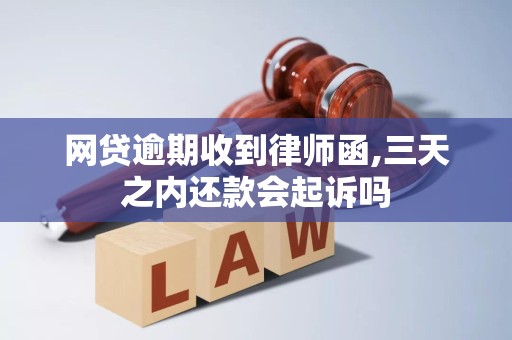If the online loan receives a lawyer’s letter after the deadline, will it be prosecuted if it is repaid within three days?

A lawyer’s letter is a legal document sent by a lawyer to the relevant parties in written form after accepting the entrustment, which is usually used to convey claims or legal warnings. In the case of overdue online loans, the receipt of a lawyer’s letter indicates that the creditor has taken further legal measures to urge the debtor to fulfill its repayment obligations. This does not mean to start the lawsuit immediately, but to convey the seriousness of the creditors. If the debtor still refuses to deal with it, the creditors may continue to enter the court prosecution stage. The lawyer’s letter plays a role of warning and prompting repayment, and it is a more serious legal reminder for those who fail to repay after the deadline.
Receiving a letter from a lawyer does not mean that you will be prosecuted immediately. The main function of the lawyer’s letter is to urge the debtor to fulfill the repayment obligation and express the creditor’s intention to take further legal action. Usually, the creditor will give a certain buffer period or repayment period, especially when the repayment period is explicitly mentioned in the lawyer’s letter. If the debtor takes the initiative to take action within three days after receiving the lawyer’s letter, such as repaying the arrears, on the whole, it is unlikely to be prosecuted immediately. Therefore, the debtor should take the lawyer’s letter seriously and raise funds to complete the repayment as soon as possible to avoid greater legal consequences.

Overdue online loans usually have a negative impact on personal credit records, and overdue information will be recorded in the credit information system, which will affect the future loan and credit card approval of individuals. Receiving a lawyer’s letter will not directly increase the impact, but long-term default on debts may not lead to more serious consequences, including being enforced after the court’s decision. Failing to deal with overdue questions in time may also be included in the list of people who have lost their trust (commonly known as "blacklist"), which will bring greater trouble to personal credit and daily life. It is best to communicate with relevant institutions quickly after receiving the lawyer’s letter and try to resolve the problem.
Usually, the lawyer’s letter clearly indicates the repayment period, such as repayment within three days. If the debtor pays the arrears within this period of time, most creditors will choose not to start the proceedings because the arrears have been settled. Litigation is not only time-consuming and laborious, but also needs to pay the corresponding legal fees, which is not the optimal solution for creditors. Repayment within the specified time limit as soon as possible is the best way to avoid legal proceedings. If you can’t repay it in one lump sum, you can try to negotiate with the online loan platform or lawyer to seek a plan for installment repayment.

If the debtor really can’t pay off the debt in one lump sum within three days, the best way is to contact the creditor or lawyer actively, explain his financial situation, and put forward a plan of repayment by installments or deferred repayment. Creditors are often more willing to solve problems by negotiation rather than directly start litigation procedures. If it keeps evading or delaying, the creditor may choose to take legal measures, which will increase the economic pressure and legal risk of the debtor. Active communication is an important step to avoid further legal disputes.
If the debtor still fails to repay after receiving the lawyer’s letter, the creditor may bring a lawsuit to the court according to law and recover the arrears through legal channels. After the court makes a judgment, if the debtor fails to perform the judgment, the creditor may apply for enforcement. This may involve the seizure or freezing of the debtor’s property, and even affect personal life. The issuance of a lawyer’s letter is a preliminary step in the legal process, and its purpose is to hope that the debtor can consciously repay the loan and avoid the extra time and cost brought by the litigation stage. The stage of dealing with the letter from the lawyer is the ideal time.

After receiving the lawyer’s letter, the debtor should carefully read the contents of the letter and check the amount owed by the online loan, the number of days overdue and the relevant clauses in the lawyer’s letter. If the amount is found to be inconsistent or the terms are questioned, you should contact the lawyer or creditor in time, raise objections and keep relevant evidence. If the debtor has encountered irregularities or usury in the process of online lending, he can also report to the relevant regulatory authorities and safeguard his rights and interests by legal means. When dealing with lawyers’ letters, we should keep calm, not only avoid expanding questions, but also strive to protect our legitimate rights and interests.
Long-term failure to deal with overdue online loans may lead to a series of serious consequences, including damage to credit records, legal proceedings, property enforcement and being included in the list of untrustworthy people. The list of untrustworthy people will have a significant impact on personal life and work, such as being unable to handle high-consumption behaviors, restricting high-speed rail and air travel. Legal proceedings may also generate additional penalty interest and lawyer fees, increasing the debt burden. It is urgent to deal with overdue debts, and solving problems as soon as possible can reduce the impact on personal life and economic status.
